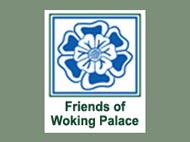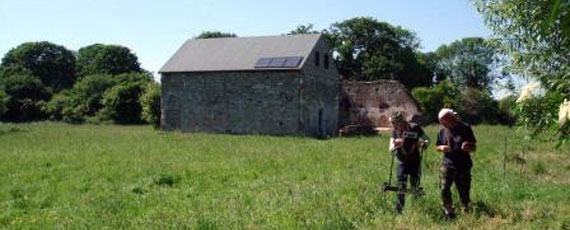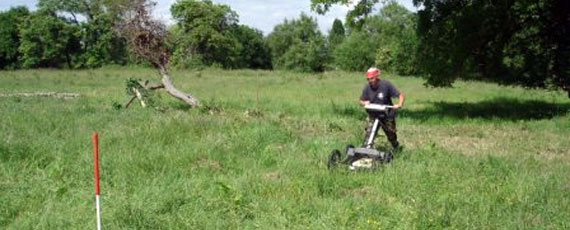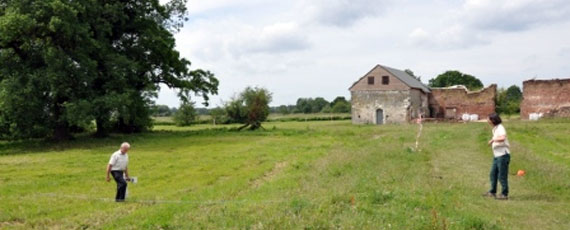Topographical and Geophysical Surveys
Modern technology can greatly assist archaeologists in their quest to understand sites they are investigating; various types of survey can be carried out prior to excavations commencing. The particular value of these techniques is that they can provide a great deal of information before excavation inevitably changes the historic layers. Before the excavations at Woking Palace started a topographic survey mapped the surface landform while resistivity, ground penetrating radar and magnetometry techniques were used to look beneath the surface for clues about what buried evidence might still exist. The different types of investigation are able to pick up a variety of information that can be combined to suggest where the most evidence might be retrieved and so where to begin the process of searching for clues to the history that lies hidden out of sight.
The topographical and geophysical surveys at Woking Palace were started on 26 May 2009, with the resistivity and Ground Penetrating Radar survey work completed by 5 June and the magnetometry survey carried out during the week commencing 15 June
Topographical Survey
A Topographical survey is a traditional survey that plots the variation in height, slope etc to produce a plan of the site. This is the starting point from which the archaeologist can begin to read “the humps and bumps” which are memories of the historical events that have affected the site.
Here, Lesley Davidson of Archaeology South East is pictured carrying out the topographical survey at Woking Palace. She used advanced GPS (Global Positioning System) kit rather than more traditional surveying equipment.
Resistivity survey
Resistivity makes use of the varying ability of soil layers and other materials to conduct an electric current. Probes feed current into the ground and measure the return signal to see the extent to which the soils conduct or resist the flow of the electricity; this technique is often good for locating buried walls and buried ditches. underway at Woking Palace. The survey was carried out by Chris Russel of Archaeology South East with assistance from Wayne Weller.
Ground Penetrating Radar survey
Ground Penetrating Radar (GPR) sends radar pulses into the ground. When these pulses encounter some change within the material beneath the surface they are reflected back giving an indication of the presence of an interface between two layers while the time taken to receive a reflection reveals how far below the surface that interface/layer is. The analysis of the resulting signals is very complex. The Ground Penetrating Radar survey was carried out by Chris Russel of Archaeology South East with assistance from Wayne Weller.
Magnetometry survey
Magnetometry is a technique that measures the magnetic properties of soil. Soil is a complex material that is made of many different parts and builds up over time. Because of this it reflects the events that have gone into its creation. Magnetometry is potentially useful for detecting kilns, hearths, kitchens and other areas affected by great heat, as well as certain types of buried pits and ditches. Magnetometry survey was carried out in June 2009 by David & Audrey Graham, assisted by Wayne Weller.
Analysis of all the results obtained by these various methods is complex taking time and computing power but arms the archaeologists with a great deal of evidence to guide them in their search for the history of the site.
The Woking Palace Archaeological Project 2009 is supported financially by Surrey County Council, Woking Borough Council, the Surrey Archaeological Society and the Heritage Lottery Fund; with ‘in kind’ assistance from Archaeology South-East (a unit of University College, London), QUEST (a unit of the University of Reading) and the Surrey Archaeological Society.
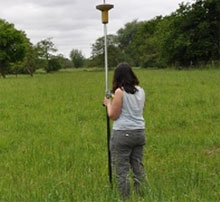
Topographical survey |
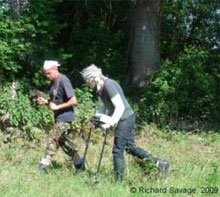
Resistivity survey |
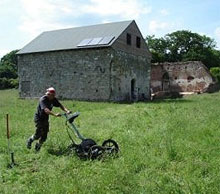
Ground Penetrating Radar survey |
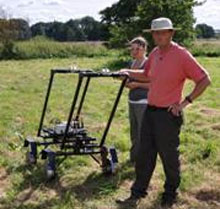
Ground Penetrating Radar survey |
